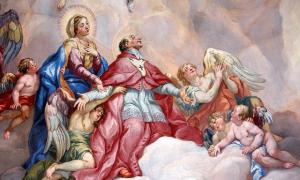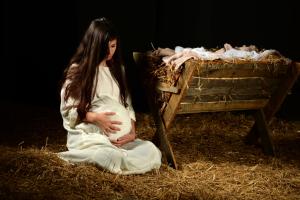 A few years ago, the Church marked the fiftieth anniversary of Humanae Vitae, Paul VI’s reaffirmation of the Church’s traditional teaching on artificial contraception. In honor of that milestone, Catholic Answers published a book of essays on the document. The staff was always offered hot-off-the-presses copies of new products, and I was eager to see this one.
A few years ago, the Church marked the fiftieth anniversary of Humanae Vitae, Paul VI’s reaffirmation of the Church’s traditional teaching on artificial contraception. In honor of that milestone, Catholic Answers published a book of essays on the document. The staff was always offered hot-off-the-presses copies of new products, and I was eager to see this one.
I still remember pulling off the plastic wrap and thumbing to the table of contents. My eyes widened when I saw the list of contributors. With the exception of a husband and wife, writing together, all of the contributors were men. I noted that the foreword was written by a prominent American cardinal. Then I turned over the book and noted the list of people who had offered promotional quotes, giving the book their personal thumbs up. All bishops. Not one layperson, let alone one woman, was listed.
Sitting there, holding in my hands a book I’d hoped I might be able to recommend to clients, and now realizing I couldn’t do that, I wondered if it was worth expressing my disappointment to the publications department. After all, the book had just been published. What was done was done. And yet…. If I didn’t say anything, how would anyone know there was a problem?
“I worked really hard on that book, and I don’t have time for this,” was the curt response when I brought my concerns to the book’s editor. I left his office quietly and went back to my desk. A few minutes later, a new email popped up in my inbox. The editor, perhaps still feeling stung by my complaint that women’s perspectives hadn’t really been featured in a book on a subject of particular importance to them, told me that he had reached out to two female writers during the planning of the book but that they’d declined to participate.
That was when I became angry. When I had the free time to spare, I did some digging on the Internet. Within an hour, I had a list of ten Catholic women who could’ve been approached about contributing to the project. I stopped at ten, point made to myself. I could’ve added more. But even though Catholic Answers had two female apologists on staff at the time, neither of us were asked to help on this project—either as contributors or to identify other Catholic women who might be interested in contributing.
An experience like this one might explain why I was completely unsurprised by Catholic philosopher Peter Kreeft’s admission that “he made a terrible mistake” while working on Socrates’ Children, his four-volume compilation of the greatest philosophers throughout history. He “somehow left out women.”
How could that be? How do you overlook women in discussing history’s greatest philosophers? And, granting that you’ve done so, how is it that this “terrible mistake” got past the editorial team? Well, what was done was done, and Kreeft was eager to make atonement. Did he put together a supplementary volume on the world’s best-known female philosophers, perhaps taking the five minutes it took me to google and find this starting point?
Alas, no. Rather, when he realized he’d ignored women’s contributions to philosophy, Kreeft suddenly discovered he’d “overlooked the greatest [philosophical] mind of them all.”
Ah. Okay. Diotima? Hypatia? Heloise? Mary Wollstonecraft? Perhaps Saints Catherine of Alexandria, Hildegard of Bingen, or Edith Stein? No, he’d neglected that heretofore unknown philosopher, Mary of Nazareth. Yes, that’s right, the Virgin Mary. And, with that, Kreeft has written a new book on how Mary is “the greatest philosopher who ever lived.” Not convinced?
This book is a one-of-a-kind study on Mary of Nazareth, the mother of Jesus. If Jesus Christ is wisdom incarnate, and if Mary loved Him more than anyone else ever did, then it holds that Mary is the greatest philosopher, the greatest wisdom-lover. With precision and humor, Kreeft not only unpacks the thought and spirit of Mary as we know her through Scripture and Church doctrine, but offers a heartfelt crash course in the basics of philosophy—methodology, epistemology, logic, metaphysics, cosmology, ethics, politics, aesthetics, and more—all through the lens of the Mother of God.
If loving Jesus makes a person a philosopher, then there are over two billion philosophers in the world right now—and that number doesn’t include all Christians over the past two millennia since the birth of Christianity. St. Luke does note that the Virgin “kept all these things, pondering them in her heart” (Luke 2:19), but I daresay that philosophy is about more than thinking deep thoughts, no matter how holy you are.
I also daresay that Peter Kreeft, who has been a professor of philosophy at Boston College for over fifty years, knows that loving Jesus and thinking deep thoughts, in and of themselves, do not a philosopher make. So, what is he up to with this new book? The book is due out later this month, so I haven’t read it. Based on the book’s description though, I’ll hazard a guess.
Kreeft evidently received blow-back for neglecting to include women in Socrates’ Children. To his credit, he seems to have taken that negative feedback seriously. So far as I know, Kreeft hasn’t yet written a full-length book about the Virgin Mary. Perhaps he saw an opportunity to stone two birds by using the earlier criticism he’d received for Socrates’ Children as a platform from which to dive into writing a book about Mary.
Lots of ladies were so upset that there were no female philosophers counted among the world’s greats? Hmm, how about a book devoted to the greatest Lady of all time? What does she have to do with philosophy? Well, God the Son is understood by the Church to be Wisdom Incarnate and his Mom loved him better than any other human person, so that means she loved wisdom. She must be the greatest philosopher who ever lived. Oh, hey, that would make a great title!
The root of the problem here—illustrated by these two books, published by conservative Catholic publishing houses—is that women’s contributions to Christian apologetics and philosophy are systemically marginalized. When the issues under discussion affect women’s lives far more significantly than they do men’s lives, women’s voices can be either overlooked or ignored. In compilations of The Greats, men are chosen by default; women, if they’re lucky, get bracketed out into Female Greats. When challenges are made, the response is either defensiveness or a patronizing deference to the “feminine genius” embodied by the Virgin Mary.
In an early issue of Catholic Answers’ magazine, This Rock, there was a humorous discussion of why women don’t engage in apologetics (or, at least, why they didn’t at that time, in the early 1990s). I still remember the conclusion of a female reader whose letter was printed in the magazine: women are far too busy tending to the home and their children to have time to argue about doctrine and morals. She was joking, but I honestly believe that all too many conservative Catholics consider publicly talking about morality, philosophy, and theology to be Men’s Work.
The solution to this problem isn’t to lionize the Virgin Mary, especially by trying to turn her into something she is not. While ticking off lists of female philosophers (and even female saints who were philosophers) can be helpful, that’s not the solution either.
The solution is to recognize that there has been a long history of marginalizing women’s voices in the Church and to consciously set about to correcting that problem. Are you compiling essays on a hot-button topic? Consider who is most affected and represent accordingly. Discussion of contraception, for example, should include both men and women—and, if anything, lean toward women’s perspectives. Collecting profiles of The Greats? Women should be represented. And if half the human race can’t be represented equally? Well, wouldn’t it be helpful to include commentary on why women haven’t had the same access men do to academia, or even to education, for much of the past few millennia?
Some years back, a female colleague was planning to write a commentary on one of the Gospels for Catholic Answers. She was leaning toward choosing the Gospel of Matthew, but I said to her, “Why not choose Luke? That’s Mary’s Gospel.” She was enthusiastic at the idea that Luke was “Mary’s Gospel” and always included that story when discussing her commentary. Her listeners were confused. “Mary wrote a Gospel? Say, what?”
No, the Virgin Mary didn’t write the Gospel of Luke, but she was undoubtedly one of the “eyewitnesses” Luke had in mind when introducing his Gospel to Theophilus (Luke 1:1–4), and was likely Luke’s major source for his infancy narrative. Luke didn’t name his sources though (which, to be fair, wasn’t really a thing then) and the Virgin went uncredited for her contributions to what we know about her Son. But it is likely through her that we know of her visit to her kinswoman Elizabeth, that we have the words of her Magnificat, that we know about Jesus being lost for three days and found in the Temple.
The Virgin’s contributions to our knowledge of her Son and to Christian thought have gone unrecognized, uncredited, even though they’re in plain sight on the pages of Scripture for anyone with eyes to see. And, in much the same way, women’s contributions to Christian apologetics and philosophy have similarly been unrecognized and uncredited.
(Image: Painting of Virgin Mary, male saint, and angels; Pixabay.)















